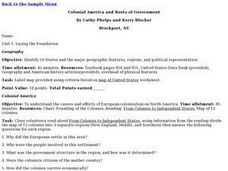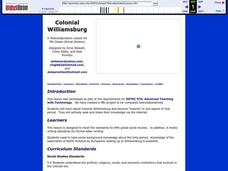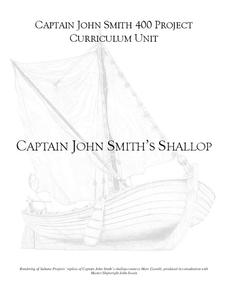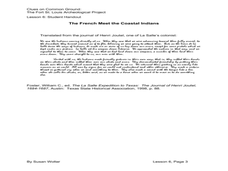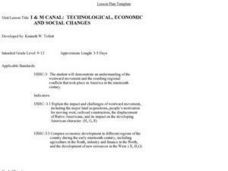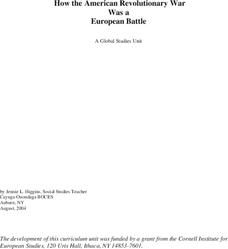Curated OER
A River, Dead or Alive: Native Americans and European Colonists' Treatment of a River
Students write an expository paragraph about the uses of the Nashua River for the Native Americans and the European Colonists. In this river uses lesson plan, students determine the causes and effects of both parties using the river.
Curated OER
Legacy of Colonialism
Pupils explore the extent of colonialism from the early periods in the 1500's to the later years in the mid 1900's. They explain how colonization differed in regions around the world and examine the lasting effects on the colonized...
Delegation of the European Union to the United States
The European Union’s Economic and Monetary Union
What are the benefits of using the Euro, the EU's common currency? What are the challenges faced? As their examination of the European Union continues, class members investigate the impact on how the switch to the Euro impacted...
Curated OER
Harvesting the New World: Changing Land Uses and Contact Between Cultures in Colonial Times
Ninth graders differentiate the Native American and European values. In this world history lesson, 9th graders define colonialism in their own words. They study the effects of epidemics and other diseases to Native American populations.
Curated OER
Colonial America and Roots of Government
Students identify 50 States and the major geographic features, regions, and political representation of each. In connection, they investigate the causes and effects of European colonization on North America. They identify the formation...
Curated OER
Colonial History: Fearless and faaithful
Students discuss reasons why early europeans immigrated to North America. Working in groups, they complete Internet activities on the PBS Website. They take a simulated voyage to the new world and rercord their actions on worksheets. ...
Curated OER
Colonial Williamsburg
Fifth graders share information on one aspect of colonial life with an email partner each week. They take on the personal of a character from Colonial iamsburg and tell their partner about they have done that day with a focus on a...
Curated OER
"Pray, Why Speakest Thou Thusly?"
Examine popular language and slang and how they have changed over the course of American history. Conduct Internet research, use an online interactive Colonial House website to translate 17th century language into 21st century language,...
Curated OER
The Colonization of the United States
Bring the Age of Exploration into the 21st century with this ancestry activity! Learners get a chance to explore the complex genealogy of the Spanish settlers through watching two video clips (approximately five minutes each) featuring...
Curated OER
The African and the Pequot in Colonial America
Students determine that the lands the English settled on were owned and inhabited by 70,000 Indians. They consider that the London Company sold land charters to the English, which gave them illegal title to lndian land and that the...
Curated OER
Myth-Conceptions
Young scholars examine the myths and misconceptions surrounding early European colonists in the New World. They analyze images, artwork, and media relating to the early colonists and discuss their accuracy.
Curated OER
Captain John Smith's Shallop
Young explorers, all aboard the shallop to discover how early European explorers would navigate the American coastline to find resources, map terrain, and trade with Native American tribes.
Curated OER
What They Left Behind: Early Multi-National Influences in the United States
Students examine how the European voyages of discovery influence American culture even today. They map eighteenth century Europe's impact on the United States.
Curated OER
Modern Interpretations
To conclude an eight-lesson study of the events that occurred in the early colonial period in Deerfield, Massachussetss, class members evaluate the point of view and bias found in late 19th and early 20th century retellings.
Curated OER
Colonial Living: A Look at the Arts, Crafts, History, and Literature of Early Americans
Sixth graders examine the different aspects of life in Colonial America. At home, they make traditional colonial recipes to share with the class. In groups, they read a book about the purpose and act of quilting and create their own...
Curated OER
Everything was up to date in 1628
Students view a video of Colonial House, a reality series where people lived according to the standards of European immigrants to the U.S. in 1628. For this colonial history lesson, students research changes in geographic areas over time...
Curated OER
Lesson 6: Examining Events from Different Perspectives Friend or Foe?
Fifth graders sequence events of European exploration and colonization by creating timelines. They define the differences between primary and secondary sources. They discuss claims to Texas land in the 17th Century.
Curated OER
I & M Canal: Technological, Economic
High schoolers read about and discuss the reasons European countries were interested in the Ohio Valley. They complete a puzzle to review vocabulary and watch a video on the Illinois Prairie and the I & M Canal. They rewrite the...
Curated OER
American Revolution: A European Battle
Students create a timeline of events during the Revolutionary War and conduct research of historical figures. They construct acrostics or diamantes of the figures' names. They evaluate the involvement of Europeans in the war.
Carolina K-12
Early American Settlements
What brought settlers from Europe to North America? By exploring primary sources, such as posters seeking recruits for the new lands, class members take a deeper look at these motivations. To finish, they present their findings to...
Curated OER
An Empire in the Balance
Eleventh graders investigate the role of New York state during the American Revolution. In small groups, they research a particular region within colonial America, analyze primary source documents, complete Document Analysis Sheets, and...
Roy Rosenzweig Center for History and New Media
European Explorers
To compare how the Spanish, French, and English approached the exploration of North America, class groups examine primary source documents and become experts on one of four explorers: Francisco Coronado, Robert LaSalle, Samuel de...
National Endowment for the Humanities
Empire and Identity in the American Colonies
The American Revolution was born out of a European conflict that spilled over into North America—and the documents prove it! Using primary sources from the era of the French and Indian War, including British plans to try to unite its...
University of California
Impact of the California Missions on Native Americans
While the Spanish claimed to bring civilization to California indigenous peoples, in reality, they also brought violence and forced assimilation to European values. Primary sources, such as the reports of Catholic priests and Europeans...




